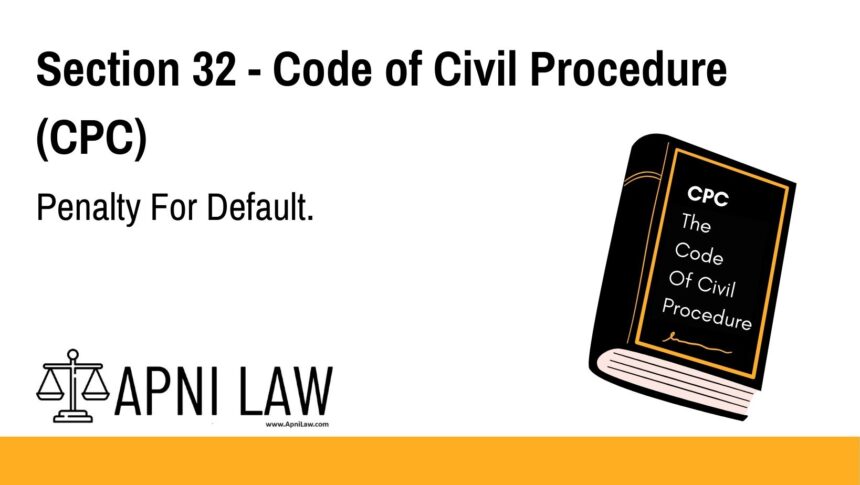Code
CPC 32 The Court may compel the attendance of any person to whom a summons
has been issued under section 30 and for that purpose may(a) issue a warrant for his arrest;(b) attach and sell his property;(c) impose a fine upon him1[not exceeding five thousand rupees];(d) order him to furnish security for his appearance and in default commit him to the civil prison.
Perfect 👍 Let’s draft the SEO-friendly structured article for Section 32 CPC – Compelling Attendance of Witnesses with proper explanation, illustrations, FAQs, and clickable internal links for Section 30 CPC.
Section 32 CPC: Compelling Attendance of Witnesses
Code
Section 32 – Code of Civil Procedure
The Court may compel the attendance of any person to whom a summons has been issued under Section 30 CPC and for that purpose may—
(a) issue a warrant for his arrest;
(b) attach and sell his property;
(c) impose a fine upon him not exceeding five thousand rupees;
(d) order him to furnish security for his appearance and, in default, commit him to the civil prison.
📖 Source: Section 32 CPC – Compelling Attendance of Witnesses (ApniLaw)
Explanation
Section 32 CPC empowers the Court to compel the attendance of witnesses who have been summoned under Section 30 CPC.
Key Provisions:
- If a witness ignores or disobeys summons, the Court has coercive powers.
- Measures include:
- Issuing an arrest warrant to bring the witness before Court.
- Attachment and sale of property of the defaulting person.
- Imposition of fine (up to ₹5,000).
- Requiring security for appearance, and in default, civil imprisonment.
This provision ensures that the judicial process is not frustrated due to non-compliance of witnesses.
Illustrations
- Example 1: Witness Avoids Summons
A person summoned to give evidence in a property dispute fails to appear. The Court issues a warrant of arrest under Section 32 CPC. - Example 2: Disobedience of Summons
A bank manager summoned to produce account records ignores the summons. The Court may attach his movable property until compliance. - Example 3: Repeated Absence
A witness continuously evades attendance despite repeated summons. The Court may impose a fine or order civil imprisonment.
Common Questions and Answers
1. What powers does the Court have under Section 32 CPC?
The Court can issue an arrest warrant, attach property, impose fines (up to ₹5,000), and order civil imprisonment to ensure attendance of witnesses.
2. Does Section 32 CPC apply only to witnesses?
Yes. It applies to persons summoned under Section 30 CPC, i.e., those required to give evidence or produce documents.
3. What happens if a witness pays the fine but still refuses to appear?
The Court may adopt multiple measures, including attachment of property or civil imprisonment, until compliance.
4. Can civil imprisonment under Section 32 CPC be indefinite?
No. The imprisonment is coercive, not punitive, and subject to CPC rules and constitutional safeguards.
5. How is this different from criminal contempt?
Section 32 CPC deals with procedural compulsion of witnesses in civil cases, while criminal contempt involves acts that obstruct or lower the authority of the Court.
Conclusion
Section 32 CPC provides the enforcement mechanism for summons issued under Section 30. It empowers courts to compel attendance of witnesses through arrest, property attachment, fines, and civil imprisonment, thereby ensuring the smooth functioning of the judicial process.
👉 For more details, visit: Section 32 CPC – Compelling Attendance of Witnesses (ApniLaw)








